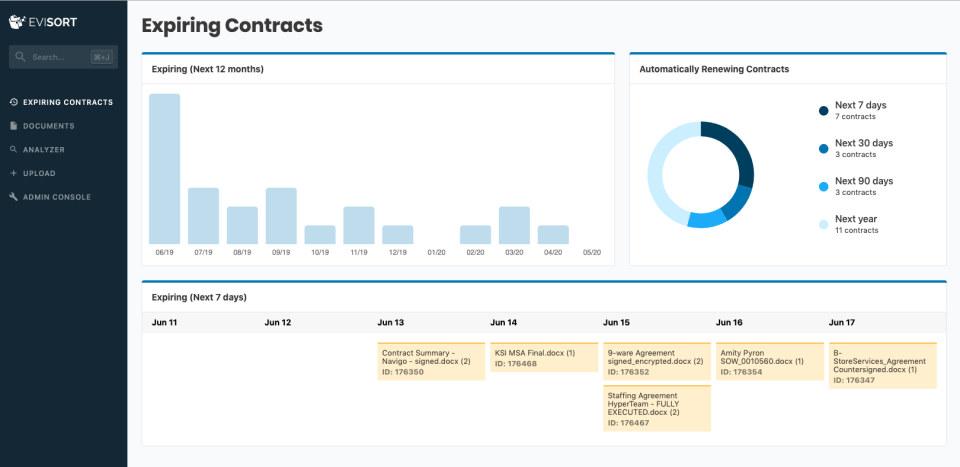Evisort is a contract management software powered by artificial intelligence. That’s a mouthful, so we’ll have to break down a few terms. One important fact is that “deep learning” artificial intelligence (AI) wasn’t possible on this scale ten years ago, because computers weren’t powerful enough. The new method in AI, deep learning is a method where, instead of explaining the rules of a task to a computer, we toss it into the problem at the deep end and let it discover the rules or even make up its own as it goes along.
Imagine the difference in creating a chess-playing engine. We can code in the strategy for every separate board position, or we can set up the basic mechanics of the game and then tell the program to play millions of games with itself and record the move sequences which led to each victory, building up a pattern database of moves over time. This method may sound haphazard, but we have to remember that computers are fast at doing “grunt work.” Deep learning has been responsible for recent leaps in facial recognition, speech recognition, and driverless car technology. In short, it offloads some of the work that used to be done by programmers, and yet is capable of discovering methods and answers we humans have overlooked even over years of research.
Indeed, the founders cited driverless cars as an influence in their inspiration to create an automated method of having Evisort text-mine contracts. Contracts are written in legal language, a very specific subset of language in general. Just as it’s easier to write a program that is good at chess than it is to write a program that’s competent at any game, Evisort is capable of digesting the specialized dialect of contracts, without the need for the larger vocabulary that would be required to, say, appreciate a novel or analyze a poem.
Once fed a scanned document, Evisort applies a discovery model to recognize legal terms and clauses, fetching out data points such as:
- Conditions
- Provisions
- Jurisdictions
- Termination triggers
- Expiration dates
- Named parties
- Liabilities
- Dollar amount pricing
Extracting these details, it can then classify them in a legal tag system. This information is then processed into a database accessible from the cloud.
What we end up with is a machine-assisted paralegal research team, able to plow through hundreds of pages of boilerplate in a matter of seconds and snap out an answer to all kinds of queries. This data can be used for tracking, to keep up to date on obligations, renewals, liabilities, and other responsibilities laid out in contracts. Reports can be generated for generalized queries like “When does our next contract expire?” Or it can be sent on a deep research errand, such as “find all named individuals for whom we have a non-compete covenant.”
Why is all of this important? Evisort doesn’t do anything in particular that a trained legal team can’t do – the important point is that it can do this thousands of times faster. Manual contract text mining is tedious, error-prone work which takes up the majority of a legal professionals’ day. Contracts are the life’s blood of the business world, the language whereby companies define their obligations. Out of contracts are built the engines which drive the business world. Being able to take a whole legal portfolio and boil it down to a pie chart, spreadsheet, or email alert is a feat that was impossible without a major law firm’s dedicated work for weeks.
Evisort is an example of an expert system, an AI agent specialized in one task which is well-defined for a distinct profession. In the field at large, AI is starting to innovate new systems to aid in dozens of dense knowledge fields: history, medical research, sociology, linguistics, and mathematics, to name a few. While fully automated AI professionals are still an impossibly long time away, we are starting to see the advent of the fully automated professional assistant – which in many ways, is even better.
